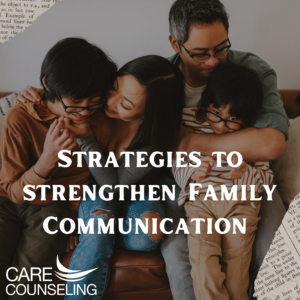Strategies to Strengthen Family Communication

Family communication plays an essential role within the family system, yet breakdowns in communication are common.
Communication breakdowns are frequently impacted by developmental changes, life stressors, and factors that impact mental health and overall sense of safety and security such as divorce and other family transitions. Children and teenagers face many challenges through development including figuring out who they are individually and within the family, seeking to be seen and heard when feeling invisible.
At CARE Counseling, our mission is “Building Community to Strengthen the Community”. This includes a commitment to supporting individuals, couples, and families by providing highly trained therapists who can work with parents and caregivers to actively create an environment where each person in the family can feel seen, heard, supported, and loved.
Parents and caregivers have the power to facilitate changes within the family. The good news is that you do not need to do it alone.
Here are some strategies that can be implemented as part of a customized plan with the support of a therapist.
Identify the presenting concerns and strengths of the family.
Having a clear understanding of the presenting concern will help tailor effective interventions. While most people could use support with communication skills, there may be specific struggles with unhelpful thinking, emotional dysregulation, social skill development, impulse control, and problematic behaviors in addition to each person’s unique genetic predisposition, stressors, supports, and lived experiences.
Understand problematic patterns and create a plan to address these.
Having open communication and the foundation of parental/ caregiver support can help build a sense of safety and trust to share openly challenges and struggles. Think about what the other person/ people need to feel safe. Validation, love, and emotional and physical safety are vital.
Learn how to identify and appropriately express feelings to provide a foundation for effective communication skills.
Many children need support in learning how to build their feelings vocabulary and emotional intelligence to where they can identify a variety of feelings. Emotional expression and modulation are important for emotional regulation and effective communication.
Learn and practice family communication skills.
Family therapists are skills experts who can help learn family communication skills. This includes instruction, modeling, and role play in addition to practice of skills outside of session.
- Introduction of skills (instruction). Think of this as the dos and don’ts of family communication such as using I-statements instead of You-statements and demonstrating specific desired behaviors such as active listening skills and learning how to use nonverbals and verbals such as facial expressions and tone of voice. Some specific skills may be specifically relevant for the caregiver such as giving clear, concise, direct instruction and focusing on one thing at a time. Introduction of family communication skills such as taking turns while speaking, using an indoor voice, and actively listening (without interruption) will help set a foundation for the application of skills. Family therapists can especially pay attention to the problematic behaviors initially identified to integrate into treatment.
- Modeling & role play to practice skills.
Family therapy sessions are an excellent format to practice family communication skills since it helps create a structured environment to practice skills shortly after direct instruction is provided. Communication should be simple and specific enough, so children are aware of what this looks like. Specific behaviors are modeled, and skills are identified to practice in and outside of the session. The therapist can help provide feedback in real-time during observation and application where they can also help shape problematic patterns and provide praise.
- Application of skills in/outside of session (generalization) is the goal.
Homework/ practice outside of the session is going to be key to seeing the generalization of skills and check-in on progress.
Individual family members who are struggling with family communication skills might need additional support. This may include specific treatment for mental health such as depression or anxiety and additional skill development such as social skills for autism or improving self-control for attention-deficit hyperactivity disorder (ADHD). Additional skills can become integrated such as family problem-solving, family-conflict resolution, and self-regulation skills. Attachment-based activities to strengthen parent-child relationships may be incorporated to help create a sense of trust and safety.
Written By: Charlotte Johnson, MA, LPCC



























